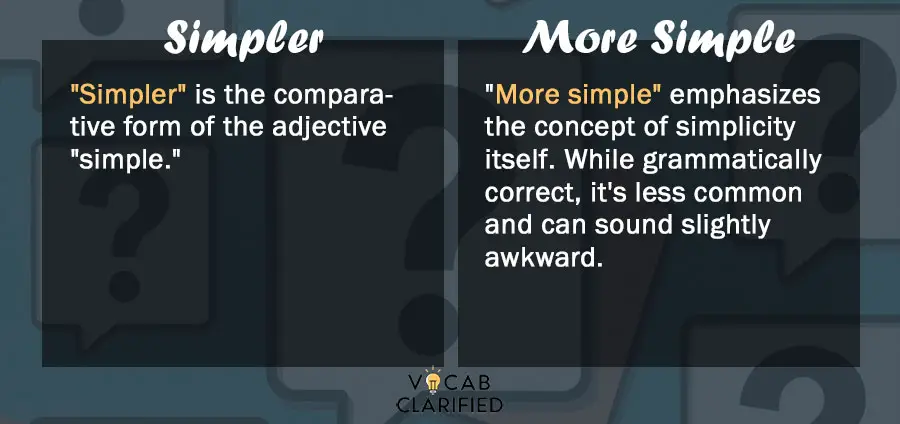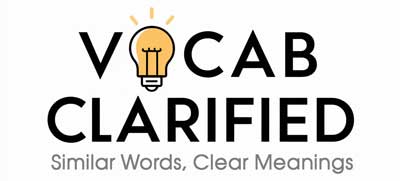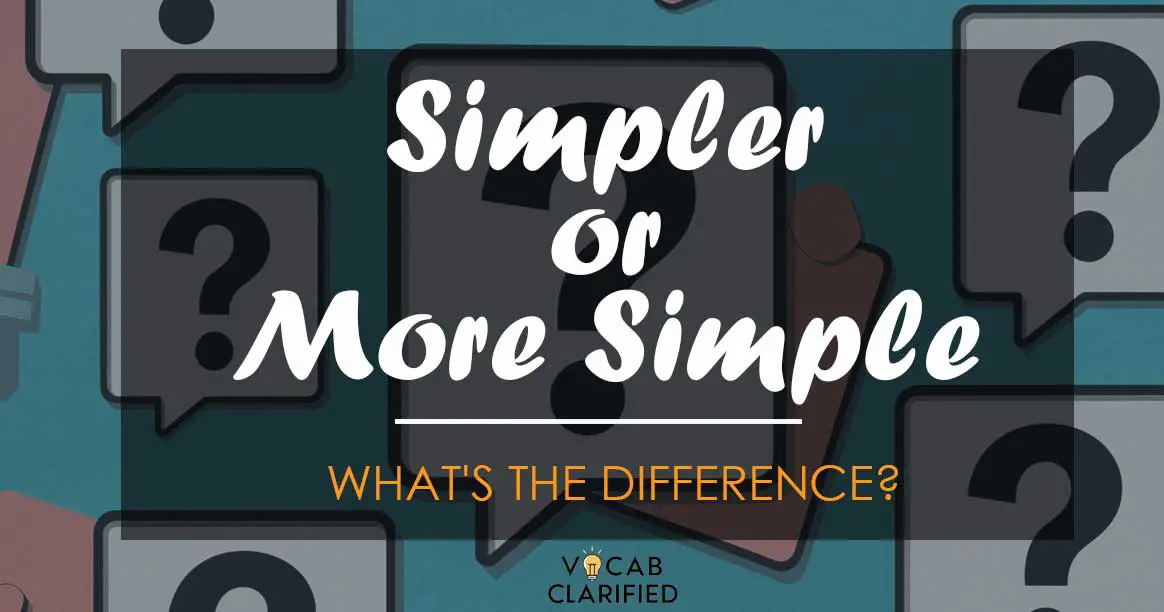Have you ever paused while writing an email, uncertain whether to describe a concept as “simpler” or “more simple”? This common linguistic stumbling block confuses many, leading to second guesses and rewrites.
If you have found yourself debating over which phrase to use in an attempt to sound more articulate or correct, you are not alone. This article aims to clarify the fog surrounding “simpler” and “more simple”, guiding you to a clearer understanding and more confident usage.
Understanding “Simpler” and “More Simple”
“Simpler” is the comparative form of the adjective “simple.” It’s used when directly comparing two things, highlighting that one is less intricate or elaborate than the other.
- “This report uses simpler language for easier understanding.”
- “We’re looking for a simpler solution to address the issue.”
On the other hand, “more simple” emphasizes the concept of simplicity itself. While grammatically correct, it’s less common and can sound slightly awkward due to its redundancy.
- In specific scenarios, “more simple” might be used for stylistic emphasis: “To beginners, this process might appear more simple than it actually is.“
Choosing the Right Option
When deciding, consider these factors:
- Flow and Readability: For a smooth and natural flow, “simpler” is generally the preferred choice.
- Emphasis: If you need to specifically emphasize the concept of “simple,” “more simple” can be used sparingly.

Practice Makes Perfect
The key to mastering these nuances lies in practice.
- Everyday communication: When crafting emails or explaining something to others, consciously choose “simpler” for clarity.
- Formal writing: In reports, presentations, or academic papers, “simpler” maintains a professional yet accessible tone.
Remember, language is a tool for effective communication. Choosing the right word, whether “simpler” or “more simple,” empowers you to convey your ideas clearly and effectively.
Side-by-Side Comparison
| Aspect | Simpler | More Simple |
| Definition | Less complicated or elaborate | A form emphasizing simplicity |
| Common Usage | “Finding a simpler solution is our goal.” | “We aim to make the process more simple for our users.” |
| Key Differences | More commonly used; flows better in speech | Less common; can emphasize simplicity |
When deciding between “simpler” and “more simple”, consider the rhythm of the sentence and the context. If aiming for a smooth, conventional flow, “simpler” is generally the preferred term.
However, if emphasizing the concept of simplicity itself is crucial, “more simple” may be more appropriate. Remember, the best choice often depends on stylistic preference and the specific context of the sentence.
Everyday Language Use
Let’s see some more examples to illustrate how “simpler” and “more simple” fit into everyday language:
- Extended example for Simpler:
- In daily conversation: “Can you suggest a simpler way to explain this to a child?“
- In technical writing: “The simpler interface improved user engagement significantly.”
- Extended example for More Simple:
- In marketing materials: “Our new model offers a more simple way to maintain your garden.”
- In academic writing: “This theory posits a more simple explanation for human behavior.”
FAQ: Simpler vs. More Simple
Both “simpler” and “more simple” are grammatically correct in English. “Simpler” is the comparative form of “simple,” commonly used in everyday conversation and writing. “More simple,” while less common, is also correct and can be used, especially for emphasis or in more formal contexts. The choice between them often depends on the speaker’s preference or the rhythm of the sentence.
Yes, “more simple” can be used in professional writing. It might be chosen for clarity or stylistic reasons, particularly when the writer wants to emphasize the simplicity aspect: e.g., “The design presents a more simple approach to the problem.” It’s perfectly acceptable, especially in academic or formal texts.
Synonyms for “simpler” and “more simple” include “easier,” “less complicated,” “more straightforward,” “less complex,” and “more uncomplicated.” Choosing the right synonym depends on the context and the specific nuances you wish to convey in your message.
Deciding between “simpler” and “more simple” depends on the flow of your sentence, the context, and personal or stylistic preference. “Simpler” is generally more common and widely accepted. However, if you find that “more simple” fits better rhythmically or emphasizes your point more effectively, it can be the better choice. Listen to the sentence out loud or consider the writing style of the document to decide.
Conclusion
Now that you have seen “simpler” and “more simple” in action, the confusion should be over. The key to mastering these nuances lies in understanding and practice.
Use this guide as a reference, and soon, choosing between “simpler” and “more simple” won’t be a problem. Remember, language is flexible, and the most important goal is clear and effective communication.

